


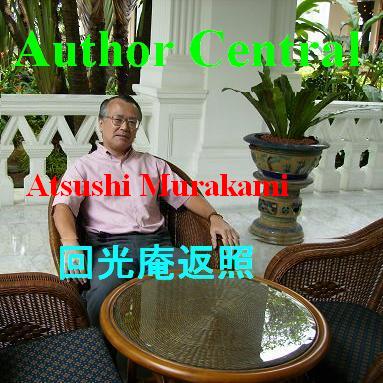


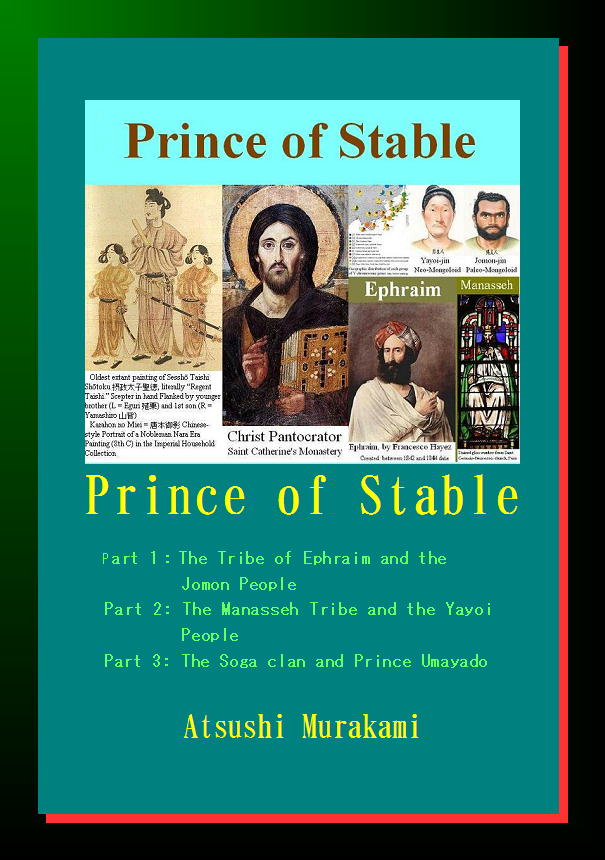
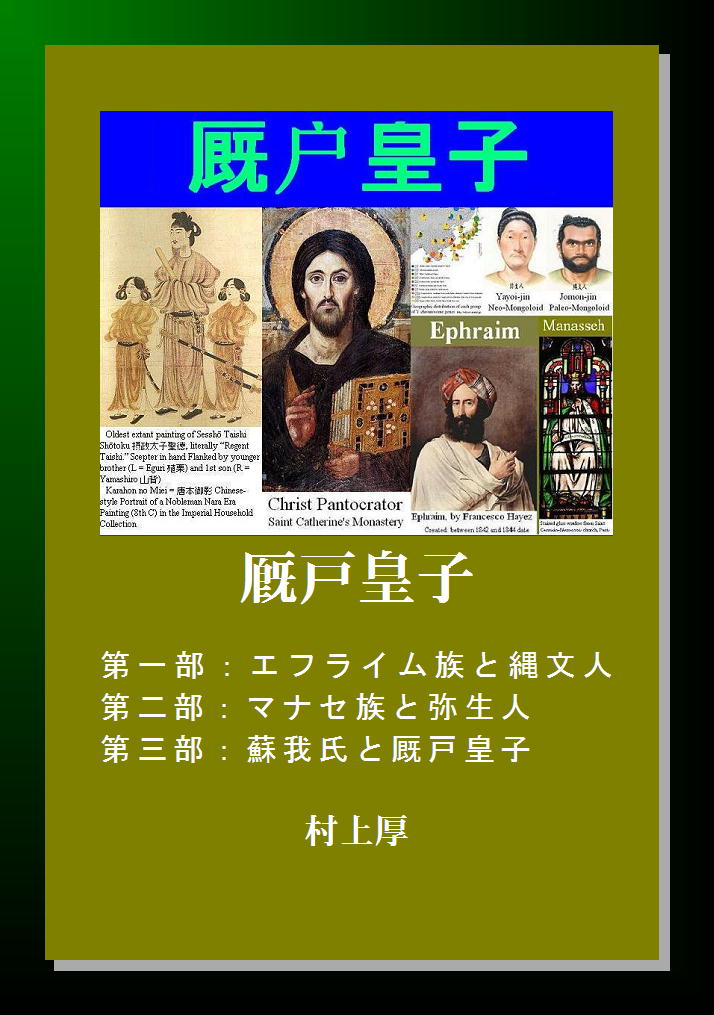
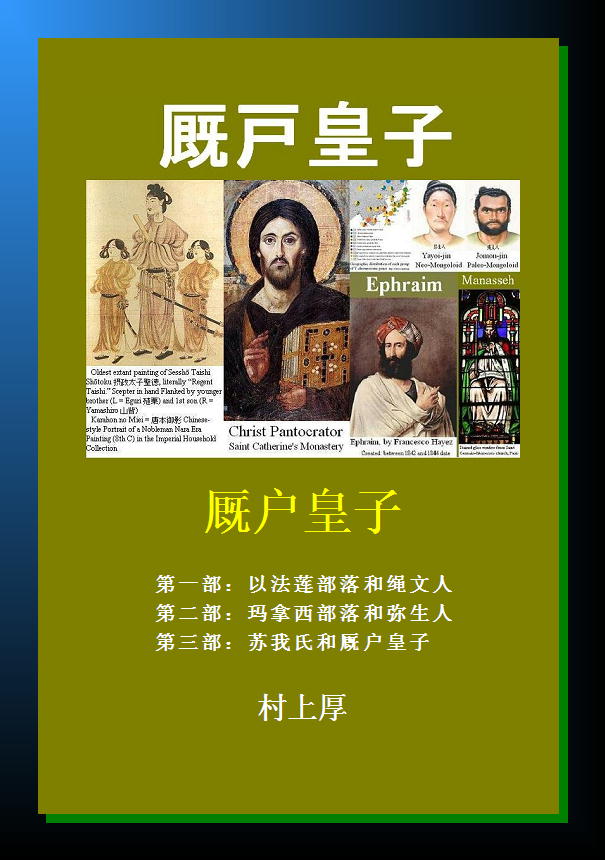

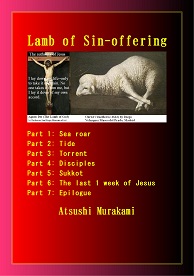

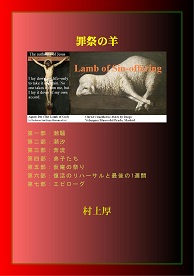

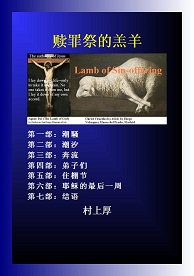
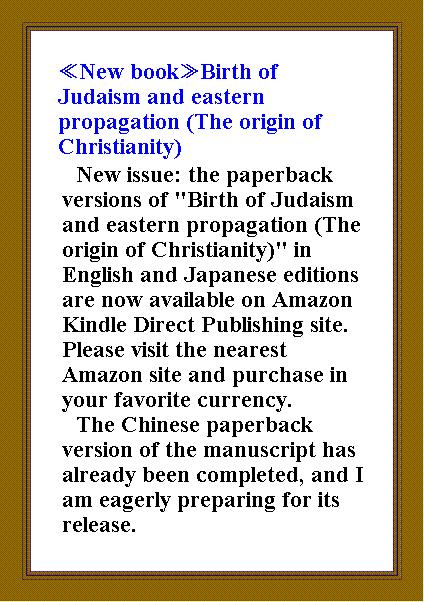
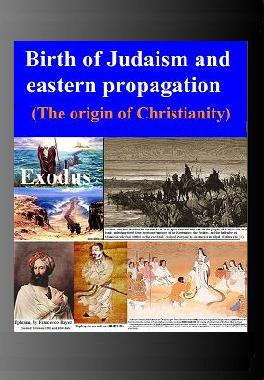
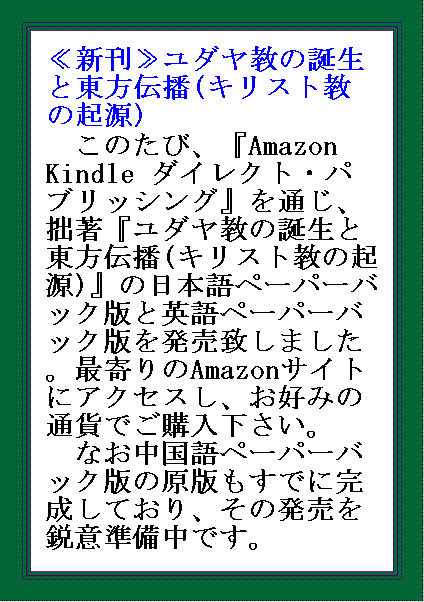
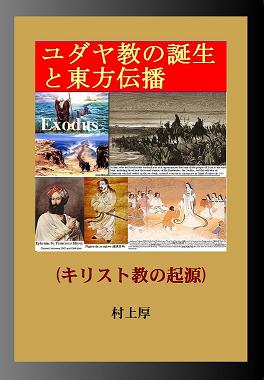

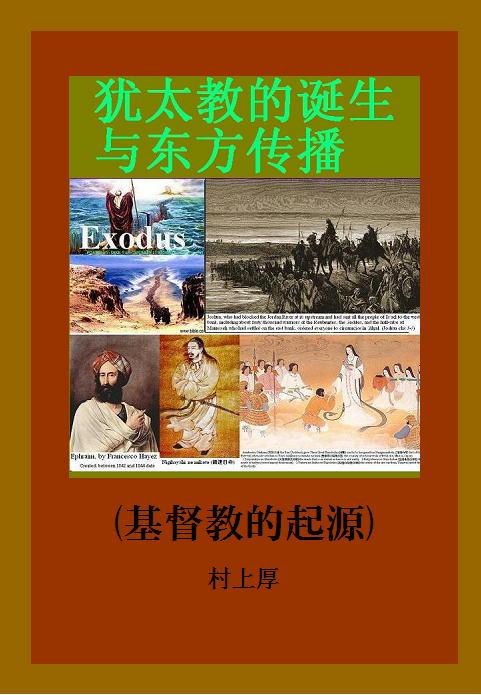
New issue:
the PDF versions of "An Epic Tale of the People of the Covenant (The origin of Christianity)" in English, Japanese and Chinese editions are now available on Google Play website in 66 countries around the world, and the ePub versions of Japanese and English editions are on Amazon website in 13 countries. All prices are worth US $ 4. Please visit the nearest site and purchase in your favorite currency.
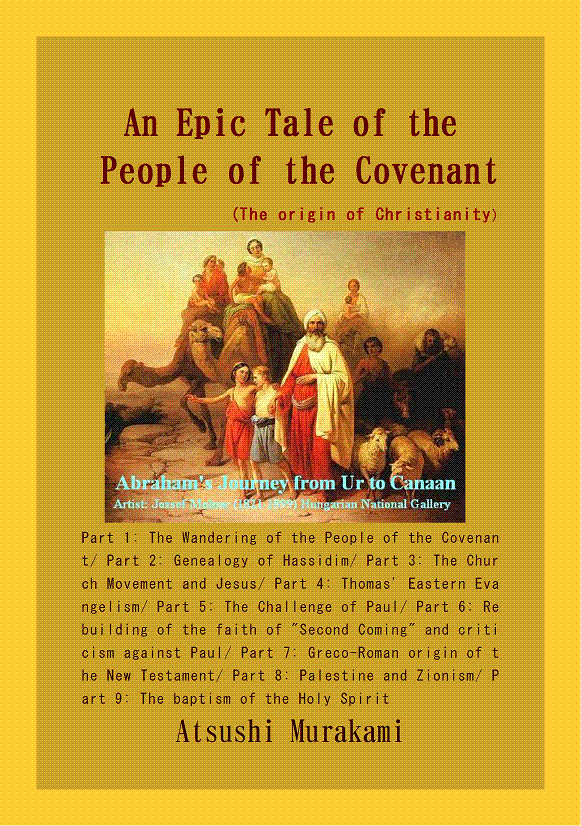
新书: 『盟约之民的史诗故事 (基督教的起源)』 的PDF形式中文,日文和英文版 在全球66个国家/地区的Google Play网站上, ePub形式日语和英语版本 则在13个国家/地区的Amazon网站上,以均为4美元的价格已出版,请访问最方便的网站,以您喜欢的货币购买。
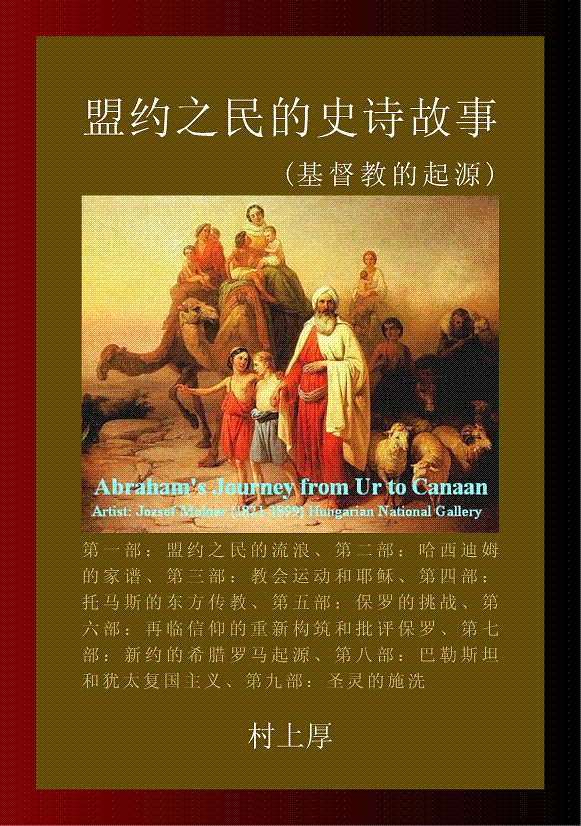


新刊: 契約の民の流浪史 (キリスト教の起源) の 日・英・中三言語のPDF版 が世界66カ国のGoogle Play Webサイトで、また 日本語と英語のePub版 が13カ国のアマゾンWebサイトで、それぞれ発売されました。お値段はいずれも4米ドル相当です。最寄りのサイトにアクセスし、お好みの通貨でご購入下さい。
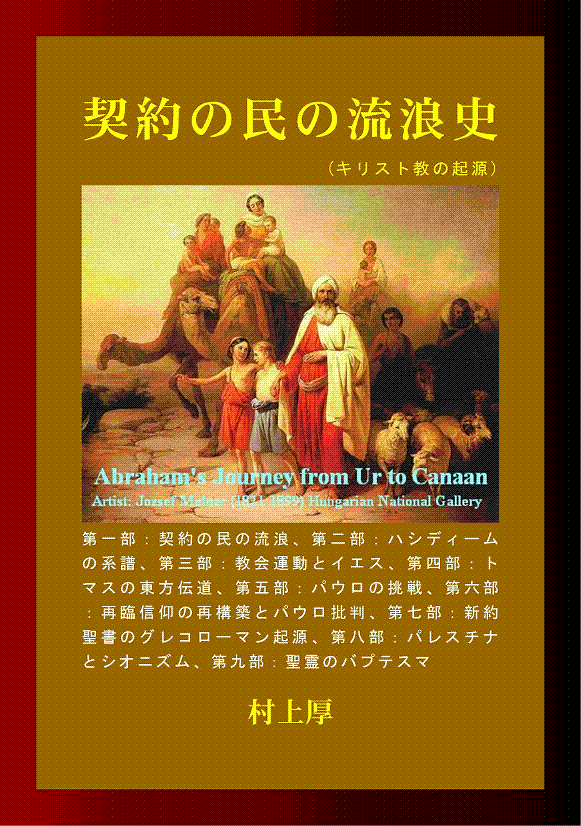


In the region from Mesopotamia situated within the Tigris–Euphrates river to Palestine, city states, where agricultural and nomadic people had lived together, have risen and fallen since ancient times. The agricultural people played leading role in the most of these city states. However, the nomads traded not only with Egypt in the west but also with India and China in the east and served as catalysts for cross-cultural fusion.
These nomads include not only tribes of Reuben, Simeon, Levi, Judah, Zebulun, Issachar, Dan, Gad, Asher, Naphtali, Joseph and Benjamin, who have cultural backgrounds of Mesopotamia and Egypt, but also Manasseh and Ephraim, who have the Y chromosome gene D, which is characteristic of the Tibetans and the Jomon people (縄文人), the indigenous people of the Japanese archipelago, and seem to have been belonged to the Paleo-Mongoloids. They had also believed in different patron gods. But they formed a union of independent tribes and established the unity of religion and politics based on the covenant of the single founder Abraham and God from 3,000 to 4,000 years ago in Palestine region and appeared on history's center stage replacing agricultural people. Thus the People of the Covenant was born.
St. Thomas traveled to Assyria around 35 C.E., two years after Jesus' ascension, and went on a mission to India, and then evangelized to China via Tibet, reached the present Beijing (北京) in 62 C.E., and seems to have established an organized church (congregation), too. By the way, why did Thomas go to the northern frontier town called Ji Xian (薊県), but not Luo Yang (洛陽) or Chang An (長安), capital cities of the later Han (后漢)?
Come to think of it, on the monument of 'Reconstruction of the Temple of Purity and Truth (重建清真寺記碑)' discovered in Kaifeng city (開封市) of eastern Henan province (河南省) of China, it is said to be written that the Jews first arrived in the city in 231 BC, when General Ben Wang (王賁) of Qin (秦) reduced Wei (魏)'s capital city, Daliang (大梁: current Kaifeng City), and formed a Jewish community. Almost ten years later, in 226 BC, General Ben Wang reduced Yan (燕)'s royal capital, Jicheng (薊城, now the city of Beijing), and Kingdom of Yan was extinguished in 222 BC.
Seen as the mother tribe of Qin (秦), the Qiang (羌) tribe was literally herders that grazed sheep, and was a typical descendants of Manasseh, according to Israeli research agency Amishav, organisation aimed at seeking the Lost Tribes of Israel.
If so, when St. Thomas visited former Yan (燕)'s royal capital Jicheng (薊城), the Jewish community there might have had a close relationship with Yamato Kingdom (大和国), which Nigihayahinomikoto (饒速日尊) had established under the cooperation of the Jewish tribe Ephraim, and Hata clan (秦氏), which was descendants of the Manasseh tribe and had been naturalized in Yamato in the Emperor Ojin (応神天皇)'s reign.
While the descriptions in the Nihon Shoki (日本書紀) and Kojiki (古事記) imply that the Japanese imperial family has blood relations with both Silla (新羅) and Baekje (百済) and it appears that the Ephraim and Manasseh tribes of the ten lost tribes of Israel seem to have acted as mediators of them.
According to the Israeli research agency Amishav, Hata clan seems to have been the descendants of the tribe Manasseh. If the description in "Honchokouinshounroku (本朝皇胤紹運録)" is correct, the current royal family, which belongs to Emperor Keitai's direct line, is likely to be the descendants of the Manasseh tribe.
从底格里斯-幼发拉底两条河流之间的美索不达米亚到巴勒斯坦的地区,自古以来农业民族和游牧民族共同生活的城邦兴亡。在大多数的这些城市里农业民族扮演主角。不过,游牧民族不仅与西方的埃及而且与东方的印度和中国交易,并扮演异体文化融合的催化剂的角色。
这些游牧民族不仅包括具有美索不达米亚和埃及文化背景的,流便(Reuben),西缅(Simeon),利未(Levi),犹大(Judah),西布伦(Zebulun),以萨迦(Issachar),但(Dan),迦得(Gad),亚设(Asher),拿弗他利(Naphtali),约瑟(Joseph)和便雅悯(Benjamin)以外,而且具有被称藏族和古代日本群岛土著绳文人,就是古蒙古人(Paleo-Mongoloids)特征的『Y染色体基因D』的玛拿西(Manasseh)和以法莲(Ephraim)。他们并信奉不一样的氏族神。但是大约在3000年到4000年前,巴勒斯坦地区的游牧民族组织了基于单一始祖亚伯拉罕与上帝盟约的一个独立的部落联盟,也就是政教合一的政体从而取代农业民族首次出现在历史舞台上作为主角。这就是『盟约之民(People of the Covenant)』的诞生。
圣托马斯于公元35年左右,也就是耶稣升天后两年已经就前往亚述,然后前往印度侍奉。从此后还经过西藏传福音到中国,于公元62年到达现在的北京,他似乎也建立了教会(会众)。即使如此,托马斯为什么没去东汉的首府洛阳或长安,却去被称蓟县的北部边境小镇呢? 想一想,在中国河南省开封市被发现的『重建清真寺记碑』上写道,犹太人于公元前231年第一次来到其城市,并设立了一个犹太人社区。这就是魏的首都大梁(现在的开封市)被王贲将军率领的秦军的攻下陷落的那一年。差不多十年后,在公元前226年,王贲将军攻下燕都蓟城(现在的北京),从而燕在公元前222年就消灭了。
被视为秦的出身部落的羌族是照字义牧羊的游牧民族。根据旨在寻找以色列失落部落的以色列研究机构阿米沙夫(Amishav),羌族是玛拿西的典型后裔。
那么在托马斯访问前燕都蓟城时,那里的犹太人社区很可能与饶速日尊在犹太部落以法莲的合作下建立的大和王国和在应神天皇治世归化大和的玛拿西部落后裔的秦氏有密切联系。
日本书纪和古事记的描述暗示日本皇室与新罗和百济都有血缘关系,那么,以色列十个失落部落的以法莲和玛拿西部落似乎做了媒介角色。
根据以色列研究机构阿米沙卜(Amishav),秦氏(Hata-uji)似乎是玛拿西(Manasseh)部落的后裔。如果《本朝皇胤绍运录》的描述正确,则属于继体天皇直系的现任皇室很可能是玛纳西(Manasseh)部落的后裔。
チグリス川とユーフラテス川に挟まれたメソポタミアからパレスチナにかけた地域には、古くから農耕民と遊牧民が共生する都市国家が興亡して来た。大部分の都市国家の主役は農耕民だったが、遊牧民は、西方のエジプトのみならず東方のインドや中国とも交易し、異文化融合の触媒を務めて来た。
これらの遊牧民には、メソポタミアやエジプトの文化的背景を有するルベン族、シメオン族、レビ族、ユダ族、ゼブルン族、イッサカル族、ダン族、ガド族、アシェル族、ナフタリ族、ヨセフ族、ベニヤミン族以外に、チベット人や日本列島の先住民縄文人に特徴的な『Y染色体D』遺伝子を保持し、古モンゴロイド(Paleo-Mongoloid)に属すると見られるエフライム族とマナセ族が含まれ、それぞれ異なる氏神を奉じていたが、今から3000年乃至4000年前に単一の始祖アブラハムと神との契約に基づく祭政一致の部族聯合を組織、農耕民に替わって歴史の表舞台に登場した。契約の民の誕生である。
十二使徒の一人トマスはイエスが昇天した2年後、したがって西暦35年頃、アッシリアからインドに赴いた後、チベットを経由して中国に伝道、西暦62年に現在の北京に至り、教会(会衆)も組織したらしい。それにしても、トマスは何故後漢の帝都洛陽や長安ではなく、薊県(けいけん)と呼ばれた北辺の地方都市に赴いたのだろうか。 そういえば、中国河南省東部の開封市で発見された『重建清真寺記碑』には、秦の王賁(おうほん)将軍が魏の王都大梁(現在の河南省開封)を陥落させた紀元前231年に同市に最初のユダヤ人コミュニティーが形成されたと記されていると言う。そのほぼ十年後の紀元前226年に王賁将軍は燕の王都薊城(北京)を陥落させ、紀元前222年に燕を滅した。
秦の母体と見られる羌族(きょうぞく)は文字通り羌(ひつじ)を放牧する遊牧民で、イスラエルの失われた十部族の帰還援助組織アミシャーブによれば、典型的なマナセの末裔という。
トマスが燕の古都薊城を訪れた当時、同地のユダヤ人コミュニティーは、饒速日尊がエフライムの協力の下に近畿地方に建てた大和国や、応神天皇の時代に日本に帰化したマナセ族の末裔の秦氏と密接な関係を保持していた可能性がありそうだ。
日本書紀と古事記の記述は、皇室が新羅と百済双方と血縁を有することを暗示しているが、イスラエルの失われた十部族の中のエフライム族とマナセ族がどうやらその媒介を務めたようだ。
イスラエルの調査機関アミシャーブによれば、秦氏はマナセ族の末裔らしい。仮に『本朝皇胤紹運録』の記述が正しいとすれば、継体天皇直系の現皇室もマナセ族の末裔と言うことになりそうだ。


An Epic Tale of the People of the Covenant (The origin of Christianity)
In the region from Mesopotamia situated within the Tigris–Euphrates river to Palestine, city states, where agricultural and nomadic people had lived together, have risen and fallen since ancient times. The agricultural people played leading role in the most of these city states. However, the nomads traded not only with Egypt in the west but also with India and China in the east and served as catalysts for cross-cultural fusion.
These nomads include not only tribes of Reuben, Simeon, Levi, Judah, Zebulun, Issachar, Dan, Gad, Asher, Naphtali, Joseph and Benjamin, who have cultural backgrounds of Mesopotamia and Egypt, but also Manasseh and Ephraim, who have the Y chromosome gene D, which is characteristic of the Tibetans and the Jomon people (縄文人), the indigenous people of the Japanese archipelago, and seem to have been belonged to the Paleo-Mongoloids. They had also believed in different patron gods. But they formed a union of independent tribes and established the unity of religion and politics based on the covenant of the single founder Abraham and God from 3,000 to 4,000 years ago in Palestine region and appeared on history's center stage replacing agricultural people. Thus the People of the Covenant was born.
St. Thomas traveled to Assyria around 35 C.E., two years after Jesus' ascension, and went on a mission to India, and then evangelized to China via Tibet, reached the present Beijing (北京) in 62 C.E., and seems to have established an organized church (congregation), too. By the way, why did Thomas go to the northern frontier town called Ji Xian (薊県), but not Luo Yang (洛陽) or Chang An (長安), capital cities of the later Han (后漢)?
Come to think of it, on the monument of 'Reconstruction of the Temple of Purity and Truth (重建清真寺記碑)' discovered in Kaifeng city (開封市) of eastern Henan province (河南省) of China, it is said to be written that the Jews first arrived in the city in 231 BC, when General Ben Wang (王賁) of Qin (秦) reduced Wei (魏)'s capital city, Daliang (大梁: current Kaifeng City), and formed a Jewish community. Almost ten years later, in 226 BC, General Ben Wang reduced Yan (燕)'s royal capital, Jicheng (薊城, now the city of Beijing), and Kingdom of Yan was extinguished in 222 BC.
Seen as the mother tribe of Qin (秦), the Qiang (羌) tribe was literally herders that grazed sheep, and was a typical descendants of Manasseh, according to Israeli research agency Amishav, organisation aimed at seeking the Lost Tribes of Israel.
If so, when St. Thomas visited former Yan (燕)'s royal capital Jicheng (薊城), the Jewish community there might have had a close relationship with Yamato Kingdom (大和国), which Nigihayahinomikoto (饒速日尊) had established under the cooperation of the Jewish tribe Ephraim, and Hata clan (秦氏), which was descendants of the Manasseh tribe and had been naturalized in Yamato in the Emperor Ojin (応神天皇)'s reign.
While the descriptions in the Nihon Shoki (日本書紀) and Kojiki (古事記) imply that the Japanese imperial family has blood relations with both Silla (新羅) and Baekje (百済) and it appears that the Ephraim and Manasseh tribes of the ten lost tribes of Israel seem to have acted as mediators of them.
According to the Israeli research agency Amishav, Hata clan seems to have been the descendants of the tribe Manasseh. If the description in "Honchokouinshounroku (本朝皇胤紹運録)" is correct, the current royal family, which belongs to Emperor Keitai's direct line, is likely to be the descendants of the Manasseh tribe.
盟约之民的史诗故事(基督教的起源)
从底格里斯-幼发拉底两条河流之间的美索不达米亚到巴勒斯坦的地区,自古以来农业民族和游牧民族共同生活的城邦兴亡。在大多数的这些城市里农业民族扮演主角。不过,游牧民族不仅与西方的埃及而且与东方的印度和中国交易,并扮演异体文化融合的催化剂的角色。
这些游牧民族不仅包括具有美索不达米亚和埃及文化背景的,流便(Reuben),西缅(Simeon),利未(Levi),犹大(Judah),西布伦(Zebulun),以萨迦(Issachar),但(Dan),迦得(Gad),亚设(Asher),拿弗他利(Naphtali),约瑟(Joseph)和便雅悯(Benjamin)以外,而且具有被称藏族和古代日本群岛土著绳文人,就是古蒙古人(Paleo-Mongoloids)特征的『Y染色体基因D』的玛拿西(Manasseh)和以法莲(Ephraim)。他们并信奉不一样的氏族神。但是大约在3000年到4000年前,巴勒斯坦地区的游牧民族组织了基于单一始祖亚伯拉罕与上帝盟约的一个独立的部落联盟,也就是政教合一的政体从而取代农业民族首次出现在历史舞台上作为主角。这就是『盟约之民(People of the Covenant)』的诞生。
圣托马斯于公元35年左右,也就是耶稣升天后两年已经就前往亚述,然后前往印度侍奉。从此后还经过西藏传福音到中国,于公元62年到达现在的北京,他似乎也建立了教会(会众)。即使如此,托马斯为什么没去东汉的首府洛阳或长安,却去被称蓟县的北部边境小镇呢? 想一想,在中国河南省开封市被发现的『重建清真寺记碑』上写道,犹太人于公元前231年第一次来到其城市,并设立了一个犹太人社区。这就是魏的首都大梁(现在的开封市)被王贲将军率领的秦军的攻下陷落的那一年。差不多十年后,在公元前226年,王贲将军攻下燕都蓟城(现在的北京),从而燕在公元前222年就消灭了。
被视为秦的出身部落的羌族是照字义牧羊的游牧民族。根据旨在寻找以色列失落部落的以色列研究机构阿米沙夫(Amishav),羌族是玛拿西的典型后裔。
那么在托马斯访问前燕都蓟城时,那里的犹太人社区很可能与饶速日尊在犹太部落以法莲的合作下建立的大和王国和在应神天皇治世归化大和的玛拿西部落后裔的秦氏有密切联系。
日本书纪和古事记的描述暗示日本皇室与新罗和百济都有血缘关系,那么,以色列十个失落部落的以法莲和玛拿西部落似乎做了媒介角色。
根据以色列研究机构阿米沙卜(Amishav),秦氏(Hata-uji)似乎是玛拿西(Manasseh)部落的后裔。如果《本朝皇胤绍运录》的描述正确,则属于继体天皇直系的现任皇室很可能是玛纳西(Manasseh)部落的后裔。
契約の民の流浪史(キリスト教の起源)
チグリス川とユーフラテス川に挟まれたメソポタミアからパレスチナにかけた地域には、古くから農耕民と遊牧民が共生する都市国家が興亡して来た。大部分の都市国家の主役は農耕民だったが、遊牧民は、西方のエジプトのみならず東方のインドや中国とも交易し、異文化融合の触媒を務めて来た。
これらの遊牧民には、メソポタミアやエジプトの文化的背景を有するルベン族、シメオン族、レビ族、ユダ族、ゼブルン族、イッサカル族、ダン族、ガド族、アシェル族、ナフタリ族、ヨセフ族、ベニヤミン族以外に、チベット人や日本列島の先住民縄文人に特徴的な『Y染色体D』遺伝子を保持し、古モンゴロイド(Paleo-Mongoloid)に属すると見られるエフライム族とマナセ族が含まれ、それぞれ異なる氏神を奉じていたが、今から3000年乃至4000年前に単一の始祖アブラハムと神との契約に基づく祭政一致の部族聯合を組織、農耕民に替わって歴史の表舞台に登場した。契約の民の誕生である。
十二使徒の一人トマスはイエスが昇天した2年後、したがって西暦35年頃、アッシリアからインドに赴いた後、チベットを経由して中国に伝道、西暦62年に現在の北京に至り、教会(会衆)も組織したらしい。それにしても、トマスは何故後漢の帝都洛陽や長安ではなく、薊県(けいけん)と呼ばれた北辺の地方都市に赴いたのだろうか。 そういえば、中国河南省東部の開封市で発見された『重建清真寺記碑』には、秦の王賁(おうほん)将軍が魏の王都大梁(現在の河南省開封)を陥落させた紀元前231年に同市に最初のユダヤ人コミュニティーが形成されたと記されていると言う。そのほぼ十年後の紀元前226年に王賁将軍は燕の王都薊城(北京)を陥落させ、紀元前222年に燕を滅した。
秦の母体と見られる羌族(きょうぞく)は文字通り羌(ひつじ)を放牧する遊牧民で、イスラエルの失われた十部族の帰還援助組織アミシャーブによれば、典型的なマナセの末裔という。
トマスが燕の古都薊城を訪れた当時、同地のユダヤ人コミュニティーは、饒速日尊がエフライムの協力の下に近畿地方に建てた大和国や、応神天皇の時代に日本に帰化したマナセ族の末裔の秦氏と密接な関係を保持していた可能性がありそうだ。
日本書紀と古事記の記述は、皇室が新羅と百済双方と血縁を有することを暗示しているが、イスラエルの失われた十部族の中のエフライム族とマナセ族がどうやらその媒介を務めたようだ。
イスラエルの調査機関アミシャーブによれば、秦氏はマナセ族の末裔らしい。仮に『本朝皇胤紹運録』の記述が正しいとすれば、継体天皇直系の現皇室もマナセ族の末裔と言うことになりそうだ。

